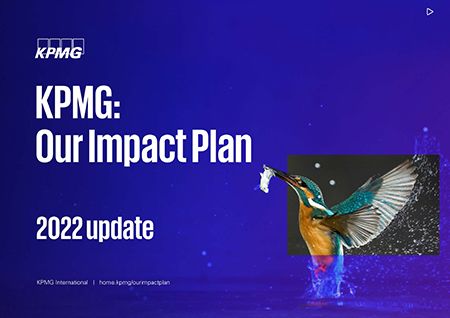It is critical that we recognize the responsibility that we play in meeting the challenges that impact the future of our planet and threaten our quality of life, now and for future generations. We are committed to supporting the responsible transformation of organizations — including our own.
Our commitments

Decarbonization
- Achieve net-zero carbon emissions by 2030

Climate risk
- Give financial markets, clients and our leaders clear, comprehensive, high-quality information on the impacts of climate change

Nature and biodiversity
- Understanding and improving our impact on nature and biodiversity
Decarbonization

As a global organization, we have a clear role to play in a just transition to net zero. In 2020, we committed to set a science-based target (SBT) aligned with a 1.5°C trajectory. Our own carbon reduction target was validated by the Science Based Targets initiative (SBTi) in 2021, committing us to reduce our emissions by 50 percent by 2030.
Grow your Impact — Actions speak louder than words
To help increase the positive impact our people have on the planet and society, KPMG has developed the Grow Your Impact platform — designed to drive and increase participation in sustainability campaigns globally.
Reducing our carbon footprint
Since 2019, our emissions have fallen by 18 percent across the global organization, which is a 24 percent reduction per individual. While this is in large part attributed to the COVID-19 pandemic, it’s also a result of efficiencies within our operations, such as investment in cloud servers, retrofitting lighting and central air systems.
Last year, as part of our SBT, we rebased our FY19 performance to include additional Scope 31 emissions, particularly emissions from our supply chain. As a result, our emissions increased to 1.8 million tCO2e1, which is the baseline for our 50 percent decarbonization commitment. The addition of our supply chain into our greenhouse gas (GHG) inventory increased our emissions footprint by over 900,000 tCO2e. And in 2021, our supply chain emissions increased by over 30 percent because of our investment in new digital capabilities and capacity.
In the past year — largely as a result of remote working — there was a 23 percent reduction in Scope 1 and Scope 21 emissions and since 2019, there was a 32 percent reduction in emissions.
It’s worth noting that we have seen significant reductions from Scope 3 emissions falling due to a reduction in business travel in the past 2 years. Overall, there has been a decline in emissions from business travel — 75 percent drop since 2020 and 89 percent since 2019.
Our challenge and our commitment are to help ensure we don’t allow business travel to return to pre-pandemic levels and we lock in the new ways of working that have allowed us to continue to deliver quality services to clients, while reducing the need to travel. We will continue to make investments in best-practice hybrid working.
Having a clear picture of our total carbon emissions helps benchmark our climate performance across the global organization and identify areas for improvement. Below is a breakdown of our total carbon emissions and emissions intensity ratio per individual:
Use below buttons to view data for each FY
Scope 1 emissions
(gross) in tCO2e
FY21 FY20 FY19
Scope 2 emissions
(location-based) (gross) in tCO2e
FY21 FY20 FY19
Scope 3 emissions
(gross) in tCO2e
FY21 FY20 FY19
Total carbon emissions
(gross) in tCO2e
FY21 FY20 FY19
tCO2e per individual
FY21 FY20 FY19
Note:
Financial year: 1 October — 30 September
Net Zero Readiness Index
To help organizations understand the challenges we face in the transition to net zero at a global level, KPMG IMPACT published the Net Zero Readiness Index, which analyzed the progress of 32 countries in reducing GHG emissions and their ability to achieve net zero by 2050.
Shifting to renewable energy
As part of our commitment to source 100 percent renewable electricity across the global organization by 2030, KPMG joined the global RE100 initiative. We will disclose information through our CDP (formerly the Carbon Disclosure Project) report. By October 2022, we’re committed to relying on 100 percent renewable electricity in our Global Board firms. Currently, 87 percent of the electricity consumed by our Global Board countries is from renewable sources.
KPMG’s renewable electricity usage across the global organization increased to 74 percent in 2021, up from 56 percent in 2020.
Renewable electricity
FY19
FY20
FY21
Note:
Financial year: 1 October — 30 September
People of KPMG
“During a live stream event during COP26 where the Asian Development Bank (ADB) announced the launch of its ambitious, first-of-its-kind partnership to establish the Energy Transition Mechanism (ETM) for Southeast Asia, I was finally able to explain to my family why I get out of bed every morning to do the work I do.
Southeast Asia’s coal plants are one of the largest carbon emitting sources in the region. The ETM program is aimed at helping countries phase out coal plants and facilitate transition by adopting clean energy and has the potential to become the largest carbon reduction program in the world.
KPMG has been at the forefront of energy transition and ESG transformation. The ETM engagement with ADB is a significant opportunity for us to collectively drive the decarbonization agenda in the emerging markets. It has been a very rewarding experience personally to work on this project led by our Climate Change and Decarbonization Leader and colleagues in Singapore, Vietnam, Indonesia, Philippines and India.
It made my family proud knowing I’m involved in something important that has the potential to trigger significant change in the region, for a better world.”
WenBin Lim
KPMG in Singapore
Setting an Internal Carbon Price
In FY22, KPMG agreed to set an Internal Carbon Price (ICP) to cover business travel and business operations globally.
Our ICP will help fund improvements across our value chain by setting a price on the emissions we generate. It will also influence investment decisions, incentivizing and, in some cases, providing the funds for KPMG firms to invest in new technologies and solutions. It will also help manage the change that’s needed across our business as we work towards our net-zero targets.
Decreasing supply chain emissions
KPMG established a global procurement ESG working group, with the objective of ensuring our suppliers are helping us achieve our commitments and are aligned with our Values. The group’s initial priority is to develop and enhance the work of our firms to deliver a net-zero supply chain.

People of KPMG
“I’m very proud of the work KPMG China does to help improve biodiversity and fresh water, ocean, wetland and forest ecosystem restoration. Since 2020, we have collaborated with Conservation International on a community-based freshwater initiative to help protect water resources in Guangdong province’s Dongjiang Basin, a major water source for the region.
Currently, we are in the midst of a 2-year initiative with Shenzhen Mangrove Wetlands Conservation Foundation (MCF) to monitor and oversee the Shenzhen Bay ecosystem, by improving the ecological quality, protecting endangered species, and promoting environmental awareness.
In addition to raising funds, KPMG employees volunteer their time to help with vegetation and small mammal surveying and wetland preservation. This first-hand information will be published in a joint report with MCF, along with other government entities, to inform further protection measurements taken in the area.”
Wilson Pang
KPMG China
Climate risk

We continue to report annually to CDP on our collective performance and management for climate-related issues, and this year, we maintained a B grade — displaying coordinated action on climate issues. To strengthen our rating, we’ll focus on quality assurance, supply chain engagement and further assessing climate risk.
KPMG plays an active role in the Taskforce for Climate-related Financial Disclosure (TCFD) to provide clear recommendations on how organizations should disclose consistent information on climate-related financial risk and the potential impacts.
We created a climate change resource center with tools and insights that help clients understand the financial reporting impacts a just transition to sustainability has on their business.
As part of Our Impact Plan, we review our climate approach and performance, and now present our progress annually to our Global Board. Risk oversight is an important part of the Global Board’s remit and it helps ensure we continue to improve our methods and services — while holding ourselves accountable.
Understanding climate risk
To understand the potential negative impact of climate change on our organization, we worked with our ESG professionals to commission a high-level physical risk assessment under a range of scenarios (RCP 2.6, RCP 4.5 and RCP 8.5)1 on the majority of KPMG member firm offices and real estate assets around the world. Once completed, we will review the findings and develop an action plan.
KPMG Climate IQ
KPMG in the UK created KPMG Climate IQ, a multi-industry risk management tool that enables companies to identify, quantify and manage their physical and transition risks due to climate change. As we continue on our journey, we’ll conduct a full KPMG Climate IQ assessment to develop a more comprehensive understanding of our exposure to climate risk. We’ll use the outcomes of this process to enhance our CDP response and as a foundation for a full TCFD report, which we plan to issue later this year.
Nature and biodiversity

Being explicit in how we manage our impact on the natural world is a vital component of how we build a culture of sustainability across our business.
Shaping a nature-positive future
To help develop a risk management disclosure framework, we joined the Taskforce on Nature-related Financial Disclosures (TNFD). Over the next few years, we’ll help the TNFD to develop and deliver a risk management and disclosure framework for financial institutions, asset managers, insurance providers and organizations to report and act on evolving nature-related risks. This will help enhance the services we deliver for clients.
Two appointees from KPMG Australia were selected as TNFD members and will play an active role, as members of the Taskforce, in shifting global financial flows away from nature-negative outcomes and toward nature-positive ones.
Case study: Boosting biodiversity, KPMG in the UK
Since 2014, the roof of KPMG in the UK’s London office has been home to two honeybee colonies, hosting a total of 80,000 bees. Before the pandemic, our colleagues had the opportunity to swap their work-suits for beekeeper-suits to visit our friends on the roof. Led by KPMG’s ‘urban bee head beekeeper’, our colleagues were able to learn about the positive impact pollinators have on boosting biodiversity, both across the UK office and in their own homes. To support the UK Department for Environment, Food & Rural Affairs’ (DEFRA) National Pollinator Strategy, we help solitary bees by placing bee hotels and planting pollinator flowers across our office. In support of the 2021 World Environment Day theme of Ecosystem Restoration, we held an employee learning session on the important role of bees and pollinators, and the ways colleagues can continue to support these insects at home. By encouraging bees to thrive, we’re strengthening the growth of plants, food and healthy ecosystems.
Becoming nature-positive and creating circularity
To address nature loss, we assessed the locations of KPMG firms around the world to better understand the impact we’re having on key biodiversity and protected areas1. KPMG is now working with our ESG professionals to develop a roadmap to become a nature-positive organization.
We’re also developing a plan to promote circularity and help KPMG become a circular organization. A circular economy — a system that does not consider used products as waste, but as raw material for reuse — is aimed at decoupling economic growth from resource consumption, helping to create long-term value. Circularity is also a critical enabler to achieve our net-zero objectives.
Case study: Fairphone circularity, KPMG in the Netherlands
KPMG’s Product Circularity Improvement Program (PCIP), in collaboration with Circular IQ, was put into action by KPMG in the Netherlands’ recent work with their client, a Dutch telecom operator, and one of their key suppliers of more sustainable and circular smartphones, Fairphone.
As one of the first telecom operators to actively work on circularity with its suppliers, the client sought a way to measure and visualize the circularity of products. Based on Fairphone's product data and insights on trade-offs in responsible material sourcing, KPMG and Circular IQ refined the product circularity report. The newly found insights sparked an in-depth discussion between the client and Fairphone, allowing both parties to understand better where their sustainability and circularity agenda’s meet.
An example of this is the trade-off between focusing on recycled content or fair mined materials (e.g., Fairtrade gold). The data-backed insights helped steer the conversation to understand Fairphone’s efforts better and the reasoning behind them, since only assessed and well-addressed impacts can lead to more sustainable and circular products like the recently launched Fairphone 4.


